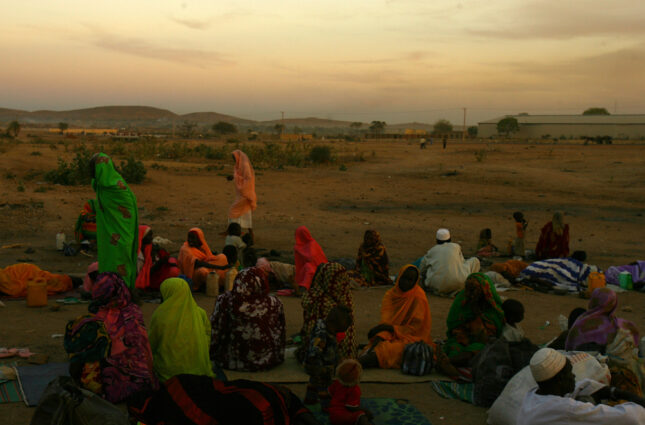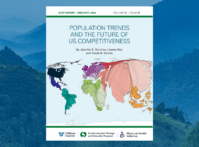-
“A Devastating Toll”: Sudan’s Maternal Health Nightmare
July 24, 2024 By Rebecca Avigad
Ongoing fighting in Sudan has led to a devastating humanitarian crisis that United Nations Humanitarian and Emergency Relief Chief Martin Griffiths calls “one of the worst humanitarian nightmares in recent history.”
Among the millions of people harmed by the fighting are countless pregnant people and new mothers, who face direct and indirect threats to their health and lives in the country’s renewed conflict. Sudan was already suffering from a maternal mortality crisis prior to the onset of its latest civil war. Before the most recent round of bloodshed, Sudan’s maternal mortality rate stood at 270 deaths per 100,000 live births in 2020 – higher than the global average of 223 deaths. And as this crisis worsens, it is imperative to call attention to what is occurring there.
Anatomy of a Humanitarian Crisis
Civil war has been raging in Sudan for over a year between the Sudanese Armed Forces (SAF) and Rapid Support Forces (RSF). The conflict began on April 15, 2023, and has since caused over 15,000 fatalities and has displaced 7.9 million people internally and 2.1 million externally to surrounding countries, including Chad, Ethiopia, and South Sudan. This forced migration has further aggravated existing refugee crises in many of these countries.
Attempts at peace plans or ceasefire discussions have continued to fail, despite sustained involvement from the international community. Negotiations are currently at a standstill. In December 2023, the U.S. State Department recognized that members of both the SAF and RSF have committed war crimes.
Sudan’s latest war is also being waged against a backdrop of existing economic, political, and climate instability. An estimated 3.7 million people were internally displaced in Sudan before the fighting even began. Additionally, more than 15 million people faced severe food insecurity. As the conflict rages on, these crises continue to deteriorate. The country currently suffers from damaged infrastructure and lack of access to safe drinking water. Food insecurity has worsened and is widespread, with the World Food Program identifying 44 hunger hotspots in Sudan, particularly around the areas of Khartoum, Kordofan, Darfur, and Gezira. And armed groups have obstructed aid deliveries, further exacerbating the humanitarian crisis.
Health conditions in the country also are dire. The World Health Organization (WHO) has reported a number of attacks and looting of healthcare facilities, verifying attacks on 28 of them within the first month of fighting. Infrastructure damage, supply and equipment shortages, and lack of power make it difficult to operate many hospitals in the country, rendering the majority unusable. Healthcare workers and medical units have been attacked as well. And disease has run rampant amidst sanitation issues, as made evident by an outbreak of cholera declared in September of 2023.
Gendered Impacts and Maternal Health Considerations
Sudan’s conflict also has specifically gendered consequences. UN Women reports that the war “has taken a particularly devastating toll on women and girls.” Sexual and gender-based violence has been weaponized throughout the course of the conflict. Indeed, the United Nations Office for the Coordination of Humanitarian Affairs (OCHA) reported that between April 15 and October 15 alone, the number of people in need of gender-based violence services in Sudan increased by over 1 million to 4.2 million. Following a February 2024 UN report, which found that numerous people had been subjected to rape and other forms of sexual violence, the UN human rights chief Volker Türk stated that some of the violations would amount to war crimes.
Such crimes are also followed by the absence of victim support. Many survivors lack health and mental health services, with suicide rates rising according to reports from local women-led organizations. The United Nations Population Fund (UNFPA) estimated in June 2024 that 6.7 million people were at risk of gender-based violence, “with displaced, refugee and migrant women and girls particularly vulnerable.”
Maternal health in Sudan has been devastated as well, with maternity hospitals included among the many healthcare facilities attacked and damaged. The WHO condemned last month’s attack on the only maternity hospital in El Fasher, with Director-General Tedros Adhanom emphasizing that “mothers and babies must be protected at all times and allowed safe access to healthcare.”
Notable news organizations are tracking the severe impacts facing women in the conflict. In May 2023, the New York Times reported on the difficulties that Sudanese women face in giving birth, and highlighted how the war has forced women to overcome numerous obstacles to even access a hospital or maternity ward when so many have closed. Those who are unable to access a hospital due to displacement or inability to leave their homes are instead forced to deliver with the help of either a midwife or a family member. Some have no help at all. And midwives—who have long been used by women in rural areas—now are playing a more active role in urban obstetric care. Yet they also face similar difficulties with access to supplies, clean water, and power.
The quality of maternal health services in Sudan has also deteriorated, with many facilities lacking necessary equipment and supplies. Some healthcare workers lack training to provide adequate care. As a result, many women have experienced adverse outcomes during pregnancy, childbirth, or the postpartum period.
The conflict is impacting newborn health as well. There is a large shortage of newborn resources, and many hospitals lack sufficient equipment to care for pre-term babies. And finally, pregnant people and new mothers often contend with psychological effects of the conflict, worsening maternal mental health.
The intersection of maternal health and consequences has long been studied. Researchers have shown that conflict increases maternal and infant mortality rates both directly and indirectly. Studies also have examined how armed conflict “indirectly affects the survival chances of women and children through malnutrition, physical injuries, infectious diseases, poor mental health, and poor sexual and reproductive health.”
The consequences to maternal mortality can also persist in the years following the onset of war. A number of interventions have been suggested in previous conflicts, including championing local health workforces; coordinating both short- and long-term activities between development and humanitarian actors; and integrating international efforts and existing infrastructure.
Sudan’s conflict is unlikely to end soon, and maternal health in the country will continue to decline. It is imperative to call attention to this ongoing crisis in order to ensure that future policies prioritize targeted interventions for maternal wellbeing.
Sources: ABC News; AP; CBC; CFR; The Lancet; New York Times; OCHA; PeerJ; UN; UNHCR; UNFPA; UNOCHA; USAID; U.S. State Department; WeForum; WHO.
Photo Credit: Thousands of refugees living in the Darfur region of Sudan are struggling to survive. kursat-bayhan/shutterstock.com
 A Publication of the Stimson Center.
A Publication of the Stimson Center.








